So Gianluca walks into my room the other day and asks “Tree-cee-ah, is it okay if I molest you?” And I thought, “Sure, why the hell not?” but instead laughed and said “You do know what that means in English, right?” Molestar is the verb for “bother” in Spanish, no me molesta!, and is misused a lot by Spanish speakers, and apparently Italians. “I am sorry to molest you”. This particular mistake always makes me feel a little better about my spanglification of words, usually by adding an “o” or “ación” to English words and then asking “eso es una palabra?” 7 times out of 10 they are. I’m helping Gianluca edit an English translation of an Italian novel his cousin wrote, so I let him molest me for a few minutes.
Wanted to post a few pics of the alfombras for the parade of La Virgen del Rosario a few weekends ago. These street carpets are made from colored sawdust and stencils, and usually depict religious scenes or messages. Sandra, I think you might like working with this bumpy material as well. I was up early so went out for coffee and loads of teenagers were prepping the streets around El Parque Central to create these colorful, creative, albeit temporary, works of art. They sift the colored sawdust over stencils of words and images and then during the course of the creation, someone, usually a kid, sometimes dressed up as a mini-ghostbuster, sprays water to keep the surface wet and colorful.
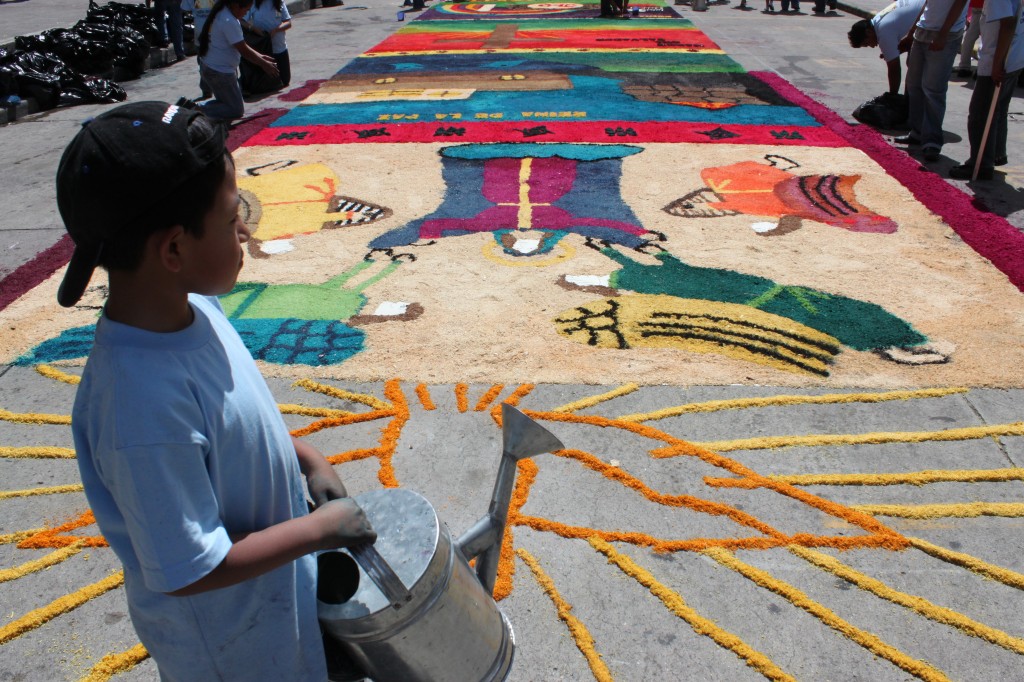
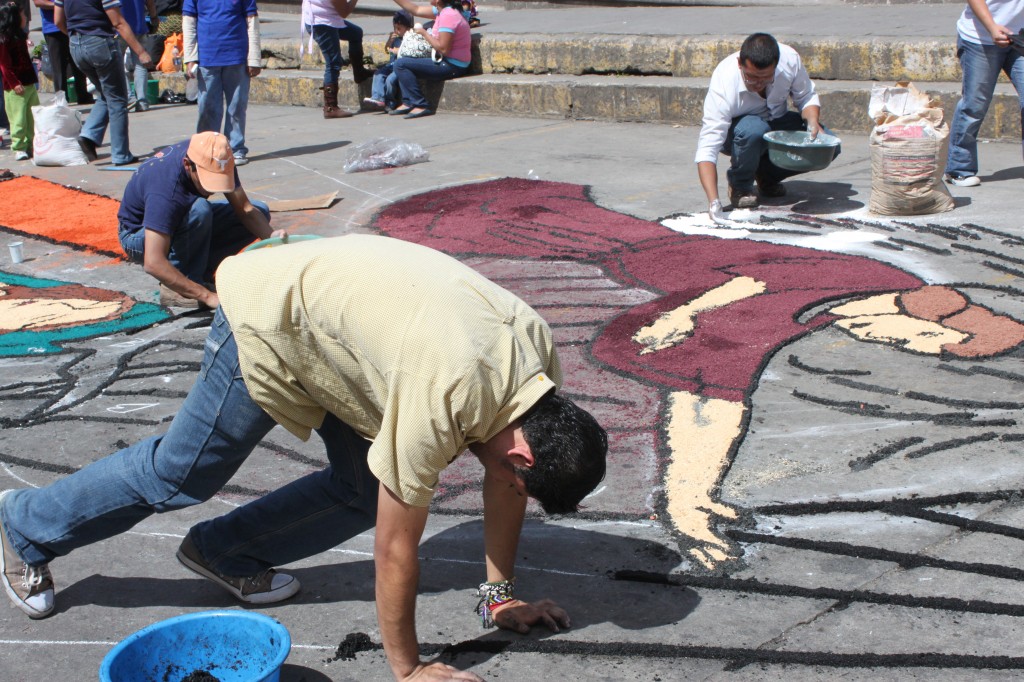
What I really wanted to write about was the Mayan ceremony I was so graciously invited to participate in last Sunday. Angel, a Mayan spiritualist and leader of Luces Escondidas, a theater group of Kakchikel and Tz’utijil youth from pueblos around Lago Atitlan (the same group that created El Rap del Condon), led us to a ceremonial spot on the slopes of Volcán Santa Maria to officiate a sort of induction ceremony for METOCA‘s upcoming Encuentro in January.
We started out at about 6am, to El Mirador to enjoy breakfast and gaze at Volcán Santaguito or Volcán Santa Maria…one of them, not sure. It was me, Angel, Stef, Lore and Leire, Lore’s roommate who hails from Bilbao, but lives in Barcelona and now in San Marcos. I really understand her Spanish, which is odd since I have been learning Central American Spanish and the accents are quite different. Lore and Flor are from Argentina, Stef is French, Angel is Guatemalan…so many different accents, no wonder I don’t understand what’s going on half the time!
The hike up was beautiful, the early morning mist and clouds gave an almost textbook ethereal quality to the whole experience. When we arrived at the lookout point, there was Santaguito, I think, or Santa Maria, sputtering and whooshing, hopefully getting ready to erupt a healthy “buenos días” to all of us. Stef said he saw an eruptions on the way up, but I was too busy looking at the incline of the hills in front of me and taking pictures of the path behind me to notice. We ate bread and cheese and fruit and tea and then much to my delight, Angel broke out some kick-ass paches! Arroz! With prunes! This was the best pache yet!
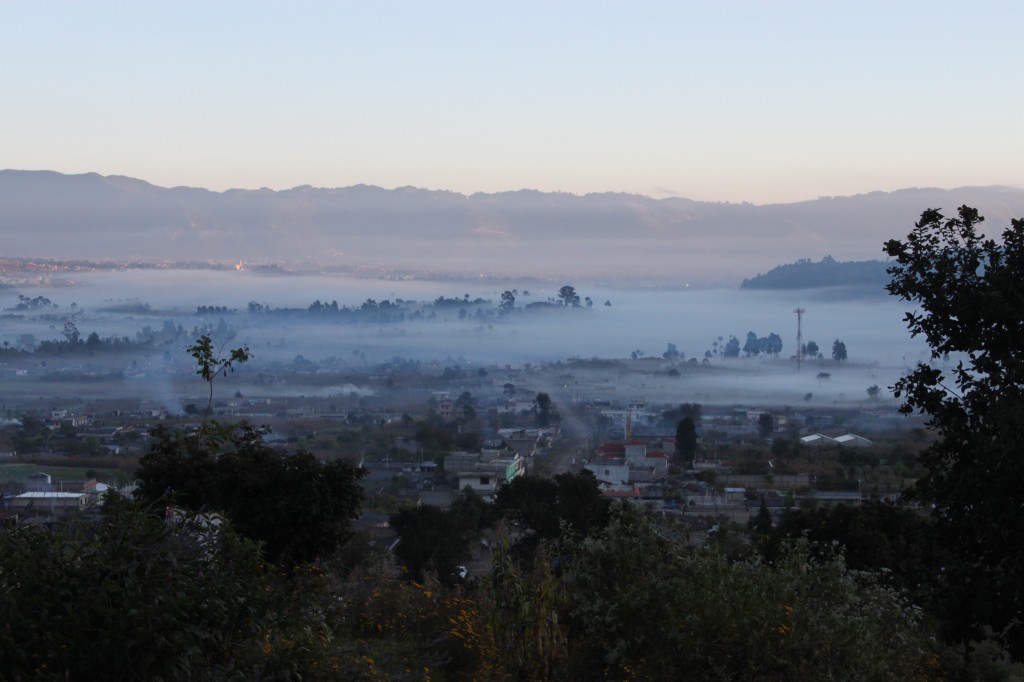
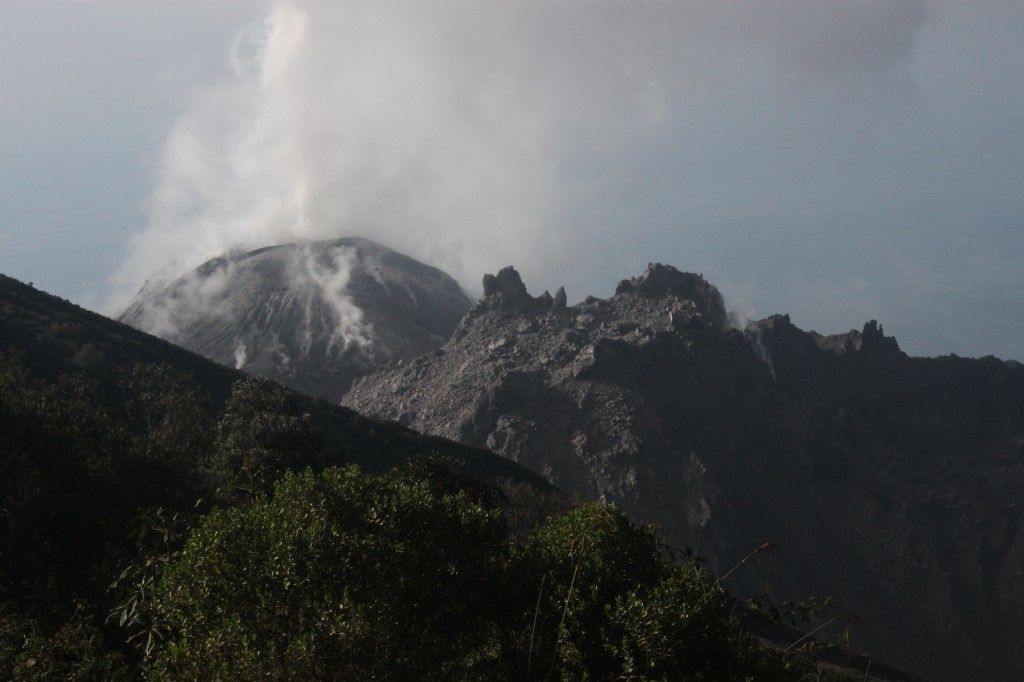
After breakfast, we went a-strolling up again, to the ceremony spot. It was in the middle of some tall grass right off a trail that went up to Santa Maria. I think the ceremony was dedicated to the success of the 10-day Encuentro that METOCA is organizing in Xela in January. The ceremony was in three parts, and from what I could understand, the first part was personal and involved Angel speaking in Kiche (a beautiful Mayan language) to a fire he created out of sugar, seeds that were dried and rolled up in corn husks, wooden slats placed over the sugar that I think was in the shape of Toj, one of the 20 days on the Mayan calendar. Those of you with last year’s calendar can see the symbol for last Sunday. And there were candles that had to be counted out in sets of 13 or 20, briquettes, incense and a bunch of other symbolic objects, like chocolate and wrapped up candy, fruit and an unwrapped pache above the fire, at the center.
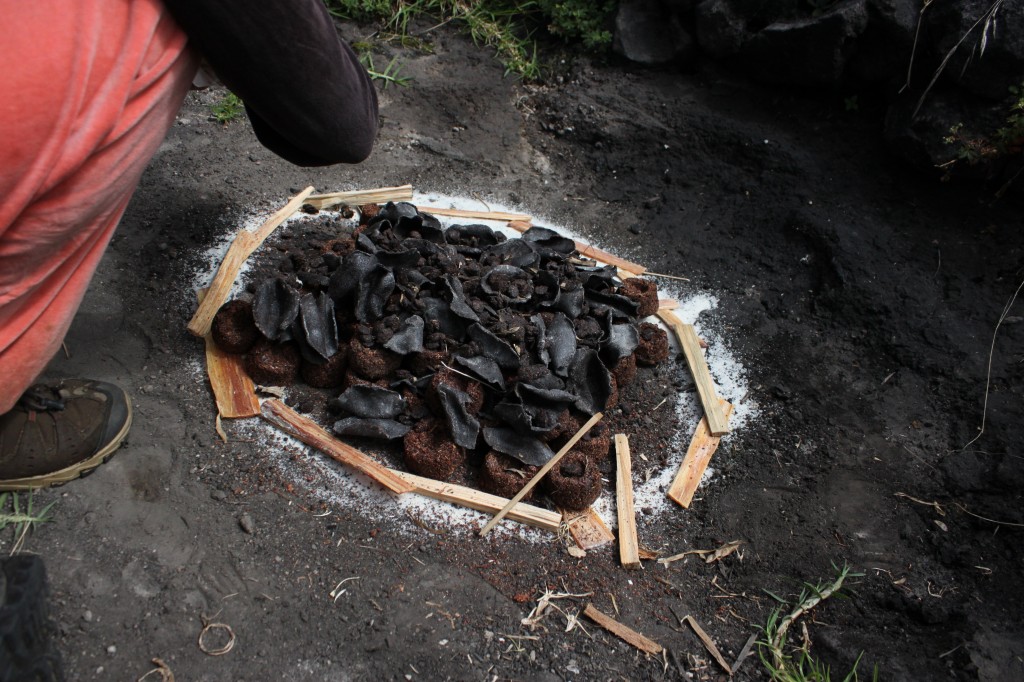
The second part was the platica, or chat, where we (and by we, I mean they) talked about the subject of the dedication and got a conversation going. Again, this is mostly surmised by the context and bits of Spanish I understood. And the third and final part was thinking about our ancestors and talking about previous subjects and connecting them to the fire and other forces of nature surrounding us. I think. During this part we also shared food and a big cigar-like thing with the fire. Chocolate, hard candy and oranges. I wish I knew what it all meant. I was hoping to get a bit of that pache too.
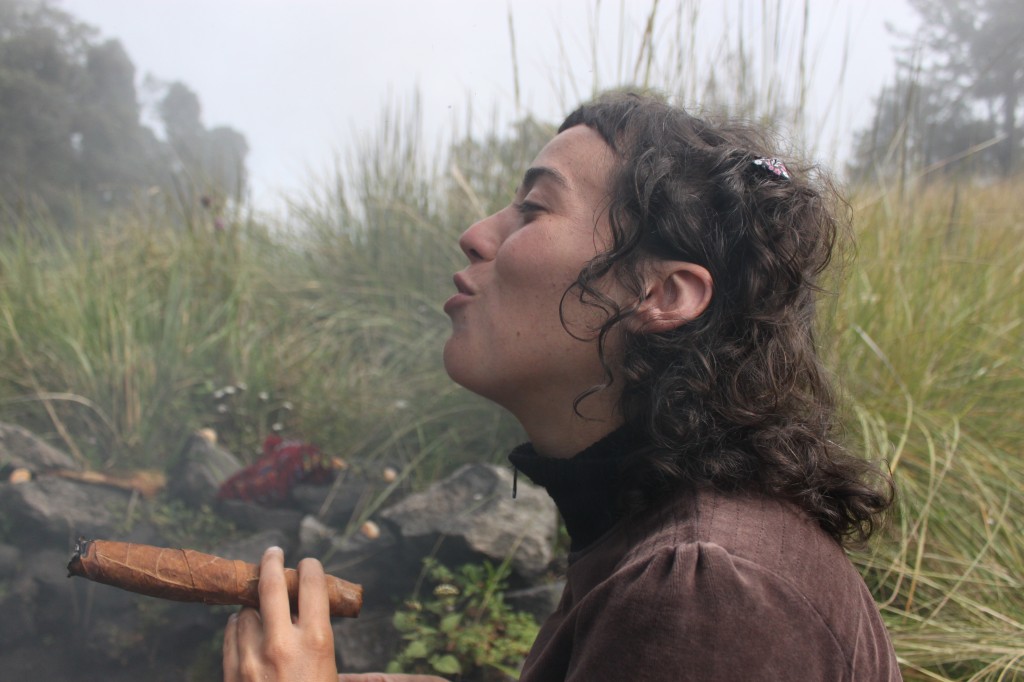
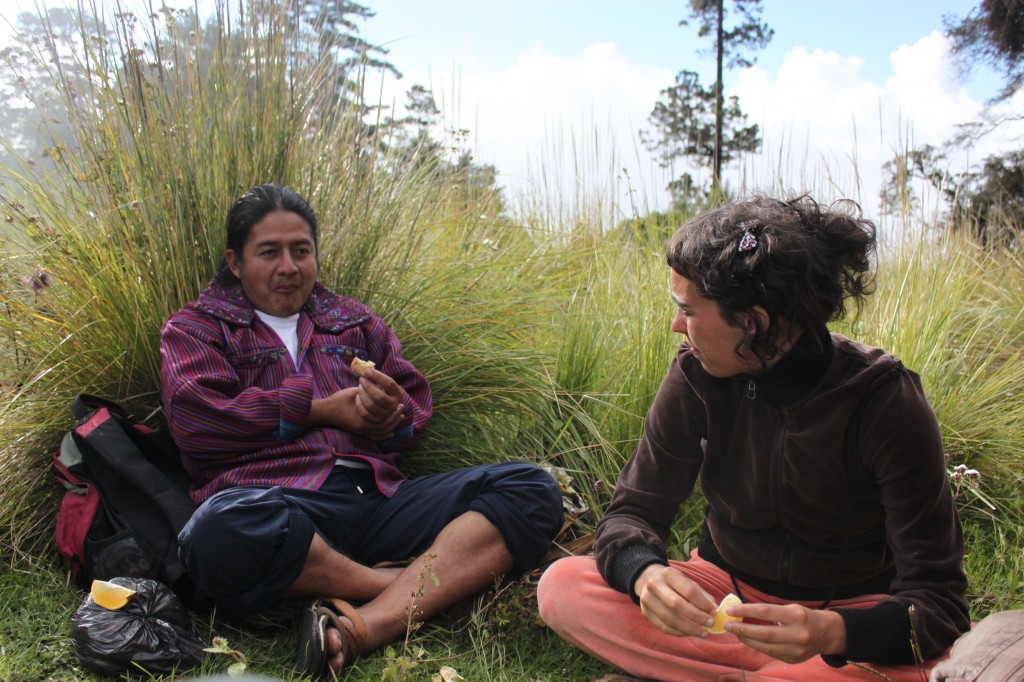
The ceremony took about 2-3 hours, I’m not really sure, because it was all so fascinating. I loved when Angel spoke Kiche, the sounds of this language along with the smoke and smell of the fire was simply hypnotic. And the sharing parts. Angel would also sprinkle aftershave or mouthwash on the fire and at the end we all took some in our hands and rubbed our clothes with it. These are the times I wish I was fluent in Spanish (or actually Kiche!) because I miss at least 50% of what’s going on and then have to make something up in my head. I am so grateful and truly feel honored that I was invited to participate. Most definitely the highlight of this trip!
As we left the site, I wondered how this afternoon would impact the following days. For me, it was the experience itself, witnessing a strange and wonderful religious/cultural event, sharing it with people I like and respect. But I wasn’t sure if one of the purposes was some sort of spiritual invocation and what that meant for the others.
I also wondered what would happen to that perfectly good pache we left behind.
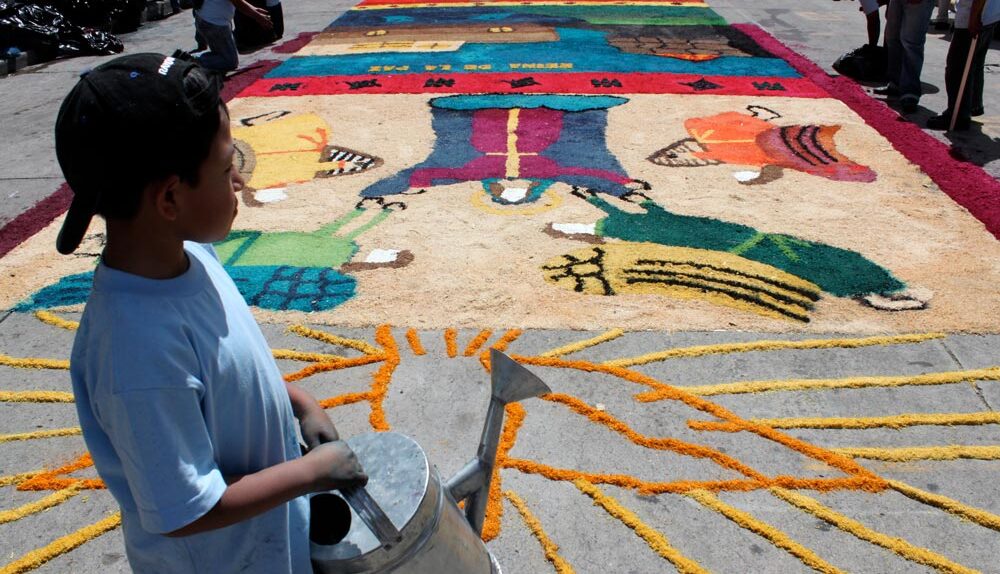
sounds amazing, thanks for sharing, be safe honey xx
Hey sweetie! How are you? Wish I could extend my ticket this time, but I have to get back ) : Miss you, swipe??? xxxooo